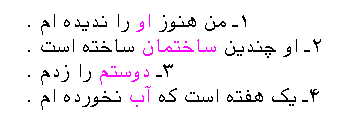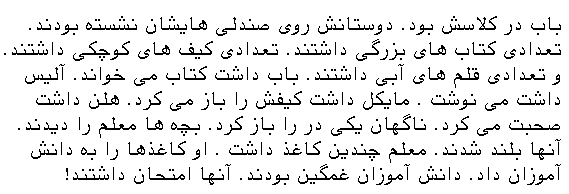Answers!!
Part 1:
1- Say and write the Persian alphabet (small and big letters). A: See lesson 1 – 10
2- Write down the complete structure of a sentence in simple past tense (subject +…). A: See lesson 17
3- Suppose that we have the infinitive “To forgive” = /bækh shidæn/. In a very simple language (either in English, Persian or in your own language), explain the structure of infinitives in Persian (what do infinitives look like in Persian) and the way we can change the infinitives to have a verb in simple past tense. Then, generalize the rule by giving two more examples on your own. A: See lesson 11
4- Write down (in Persian) four complete sentences in simple past tense (Your sentences should have all possible elements such as place, time, object, and so on). A: See lesson 17
5- Find the objects in these sentences:
6- Write (either in Latin alphabet or in Persian scripts) the following numbers: 0 – 1360 – 35 – 700 – 2003 – 32000 A: See lessons 18- 25
7- Suppose that you are going to teach somebody how to read 53225 in Persian. Explain it in simple words so that he can understand the general rule. A: See lesson 28
8- Suppose that we have the infinitive ‘To wash’. Explain in simple word (in any language) how we can change it into present perfect tense verb. Then say the verb with all subjective pronouns. A: See lesson 28
9- How should we translate ‘For’ and ‘Since’ in present perfect tense? Explain it. A: See lesson 32- 33
10- How do you know such and such word is an object in your Persian sentences? (What is your object indicator?). Explain when you should and should not use this object indicator in your sentences (give examples). A: See lesson 22- 34
11- Write down the days of a week in Persian scripts. A: See lesson 36
12- How do you make simple future tense? Give an example using all subjective pronouns. A: See lesson 37
13- How are compound verbs used in simple future tense? Give an example. A: See lesson 38
14- Explain (in any language) the negative form of compound verbs in simple future tense, giving an example in a sentence. A: See lesson 40
15- Explain (in any language) past perfect tense and give an example in complete sentence. A: See lesson 44
16- Explain how we can change an infinitive into a verb in simple present tense. Give an example. A: See lesson 53
17- Explain present continuous tense in Persian. Give an example. A: See lesson 69
18- What are the four seasons in Persian? What are the months of summer and autumn? A: See lesson 75
19- How can we make comparative adjectives in Persian? Explain it using an example. A: See lesson 77
Part 2 (Listening ability):
1- Listen to the audio file and write down 10 words. A: /ba:/ – /sæla:m/ – /in/ – hæfteh/ – /a:mrika:/ – /chæha:r/ – /ja:yezeh/- /yek shænbeh/ – /gozæshteh/ – /chæshm/ – …
Audio words2- Listen to the audio file and repeat the same sentence (tongue twister).
Tongue twisterA: /emshæb shæb _e_ seh shænbæs. færda: shæbæm seh shænbas. seh shæb digeæm seh shænbæs. in seh seh shæb, u:n seh seh shæb, hær seh seh shæb seh shænbæs/!
3- Listen to the audio file and write down the name of 8 countries. A: Australia – Newzealand – Germany – France – Norway – Sweden – Denmark – Finland
Rafighi daram4- In the above audio file, who is he talking about? A: He is talking about his friend who travels a lot.
Part 3 (Translation ability):
1- Translate the following text into Persian.(10 minutes- Marks: 3.5)
Bob was in his classroom. His friends were sitting on the chairs. Some had big books. Some had small bags. And some had blue pens. Bob was reading a book. Alice was writing. Michael was opening his bag. Helen was speaking. Suddenly, somebody opened the door. The children saw the teacher. They stood up. The teacher had several papers. He gave the papers to the students. They were sad. The students had exam.
To stand up = ![]() /bolænd shodæn/.
/bolænd shodæn/.
Part 4 (optional):
How would you teach Persian to a foreigner if you were a Persian teacher? Which part of the language would you focus on more? What would you add to or deduct from our weekly lessons if you were the teacher of this online course? How would you take the exam? (Feel free to send me your answers to this optional question)


balram bodhi
October 5, 2012 @ 9:36 am
I am a slow learner sir,but I am consistant. ……….thanks a tron.
Sajjad Hussain
May 12, 2014 @ 11:47 am
In Lesson 81 the passage in Part 3 is in present tense, but when we go to the Useful Drills 81 all the verbs are change to past tense and then translated? Will someone please explainn.
Monika
January 30, 2015 @ 2:32 pm
I don’t think the part 3 text here matches the text from the exam. Tenses changed.